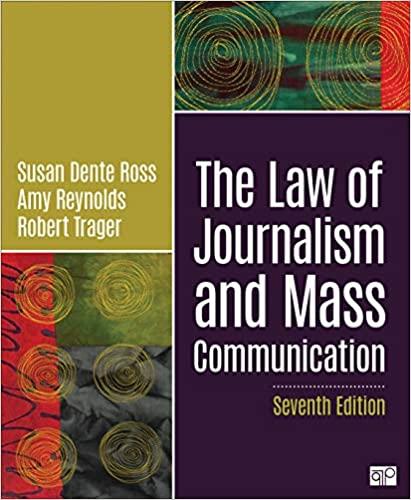Question
Case: Harper v. Blockbuster Entertainment Corporation Male employees sued employers under Title VII and Florida Civil Rights Act, alleging that employer's grooming policy, which prohibited
Case: Harper v. Blockbuster Entertainment Corporation
Male employees sued employers under Title VII and Florida Civil Rights Act, alleging that employer's grooming
policy, which prohibited men, but not women, from wearing long hair, discriminated against them on
the basis of gender. The court held that the grooming policy did not violate Title VII or Florida law.
Carnes, J.
In May of 1994, Blockbuster implemented a new grooming policy that prohibited men, but not women, from wearing long hair. The employees, all men with long hair, refused to comply with the policy. They protested the policy as discriminatory and communicated their protest to supervisory officials of Blockbuster. Two of the employees were the subject of media stories concerning their protest of the policy. All of the employees were subsequently terminated by Blockbuster because they had refused to cut their hair and because they had protested
the grooming policy. The employees allege that Blockbuster's grooming policy discriminates on the basis of gender in violation of Title VII. In Willingham v. Macon Telegraph Pub. Co., our predecessor court held that differing hair length standards for men and women do not violate Title VII, a holding which squarely forecloses the employees' discrimination claim. [In Willingham, the court stated]: Willingham argues that the Telegraph discriminates among employees based upon their gender in that female employees may wear their hair any length deemed acceptable by the Telegraph. He, therefore, asserts that he was denied employment because of his gender because were he a girl with identical length hair and comparable job qualifications, he (she) would have been employed. We conclude that the undisputed discrimination practiced by the Macon Telegraph is not based upon gender, but rather upon grooming standards, and thus not a violation of Title VII. We perceive the intent of Congress to have been the guarantee of equal job opportunities for males and females. Providing such opportunity is where the emphasis rightly lies. This is to say that Title VII should lie to reach any device or policy of any employer which serves to deny acquisition and retention of a job or promotion in a job to an individual because the individual is either male or female. Equal employment opportunity may be secured only when employers are barred from discriminating against employees on the basis of immutable characteristics, such as race and national origin. Similarly, an employer cannot have one hiring policy for men and another for women if the distinction is based on some fundamental right. But a hiring policy that distinguishes on some other ground, such as grooming codes or length of hair, is related more closely to the employer's choice of how to run his business than to equality of employment opportunity. Hair length is not immutable and in the situation of an employer, vis--vis employee enjoys no constitutional protection. If the employee objects to the grooming code he has the right to reject by looking elsewhere for employment or alternatively he may choose to subordinate his preference by accepting the code along with the job. We adopt the view, therefore, that distinctions in employment practices between men and women on the basis of something other than immutable or protected
characteristics do not inhibit employment opportunity in violation of Title VII. Congress sought only to give all persons equal access to the job market, not to limit an employer's right to exercise his informed judgment as to how best to run his shop.
Step by Step Solution
There are 3 Steps involved in it
Step: 1

Get Instant Access to Expert-Tailored Solutions
See step-by-step solutions with expert insights and AI powered tools for academic success
Step: 2

Step: 3

Ace Your Homework with AI
Get the answers you need in no time with our AI-driven, step-by-step assistance
Get Started


